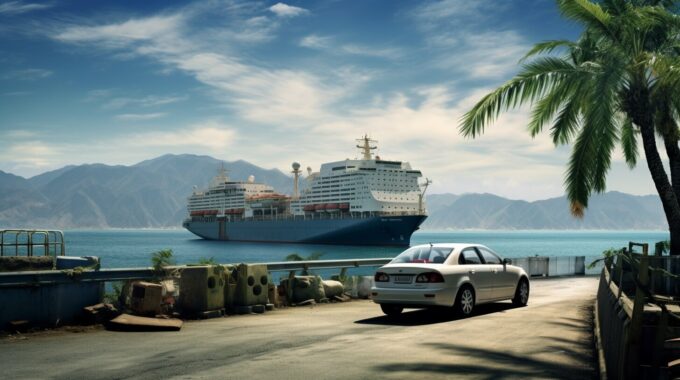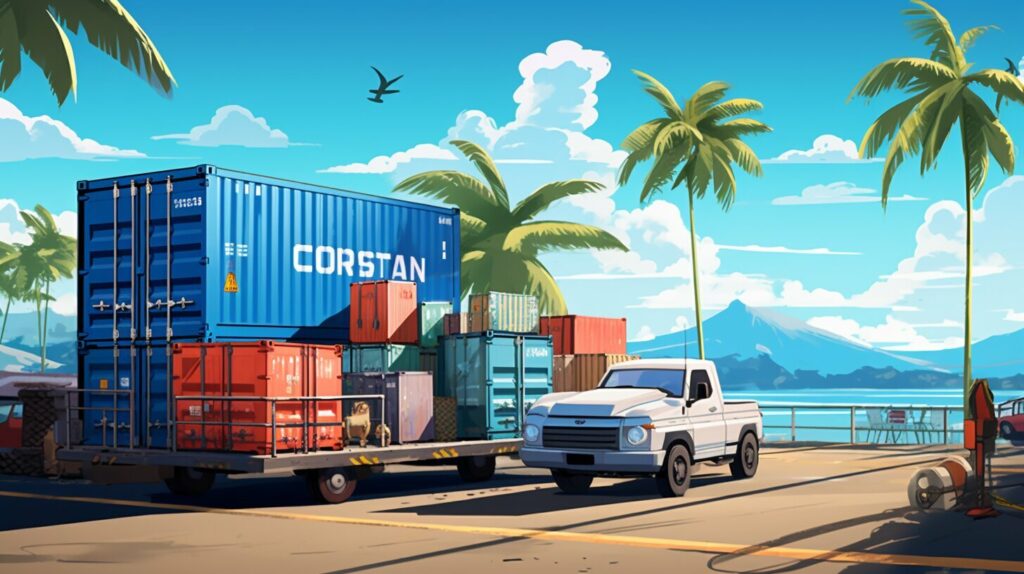At the forefront of property financing in Costa Rica, GapInvestments.com stands as a beacon for…

Guide to Importing a Car to Costa Rica: What You Need to Know
Importing a car to Costa Rica can be a complex and costly process, but with the right information and guidance, it can be successfully navigated. When considering importing a car to Costa Rica, it’s important to understand the regulations, fees, and documentation required. Additionally, factors such as shipping, parts availability, and inspection should be carefully considered. This guide aims to provide a comprehensive overview of the car import process in Costa Rica, allowing you to make informed decisions and successfully import your vehicle.
Key Takeaways:
- Importing a car to Costa Rica involves high import taxes based on the value and age of the vehicle.
- Vehicles must be certified as safe for travel and pass inspections upon arrival.
- New cars in Costa Rica are more expensive than in the United States, so buying a new car locally may be a more cost-effective option.
- Popular car brands in Costa Rica include Toyota, Nissan, and Mitsubishi due to their reliability and parts availability.
- When buying a used car, it’s recommended to purchase from reputable dealerships and have the vehicle inspected.
Understanding Car Import Regulations and Fees in Costa Rica
Before importing a car to Costa Rica, it is important to understand the regulations and fees imposed by the Costa Rican government. The process can be complex and costly, so being well-informed is crucial to avoid any unexpected expenses or delays.
One of the main factors to consider is the import tax on vehicles. This tax is based on the value and age of the car, with older vehicles being subject to higher tax rates. It’s worth noting that the assessed value is determined by the Costa Rican government, not the Kelley Blue Book value. Therefore, it’s advisable to research the potential tax implications before making any import decisions.
In addition to import duties, there are other fees associated with importing a car to Costa Rica. These include vehicle import fees, which vary depending on the type and size of the vehicle. It’s also important to ensure that all necessary documentation is in order, such as the vehicle’s title, registration, and insurance. Failure to comply with the required paperwork can lead to delays and additional costs.
When considering importing a car to Costa Rica, it’s essential to factor in the time and effort required for inspections and certification. Vehicles must be certified as safe for travel and pass inspections once they arrive in Costa Rica. This process typically takes around three months, so it’s important to plan accordingly.
| Regulation/Fee | Details |
|---|---|
| Import Tax | Based on the value and age of the car. Older vehicles have higher tax rates. |
| Vehicle Import Fees | Varies depending on the type and size of the vehicle. |
| Required Documentation | Includes the vehicle’s title, registration, and insurance. |
| Inspections and Certification | Vehicles must be certified as safe for travel and pass inspections upon arrival in Costa Rica. |
Considering the potential costs and complexities of importing a car to Costa Rica, it’s worth exploring alternative options. New cars in Costa Rica are generally 25-30% more expensive than in the United States, so buying a new car locally may be a more cost-effective solution. Popular car brands in Costa Rica, such as Toyota, Nissan, and Mitsubishi, offer reliability and availability of parts, which is an important consideration when choosing a vehicle.
For those interested in purchasing a used car, it is advisable to work with reputable dealerships and have the car inspected to ensure its condition. It is also possible to hire an English-speaking broker to assist with the import process and provide guidance throughout the car-buying journey.
Importing a car to Costa Rica involves various costs and regulations. It is important to carefully evaluate the financial implications and consider alternative options, such as buying a new car locally. By understanding the regulations and fees and conducting thorough research, individuals can make informed decisions when it comes to importing a car to Costa Rica.

When importing a car to Costa Rica, there are several factors that should be taken into account to ensure a smooth and cost-effective process. First and foremost, it is important to consider the availability of parts for imported cars. Costa Rica has specific import regulations and restrictions, which may affect the availability and cost of parts for certain vehicle makes and models. Before importing a car, it is advisable to research the local market and speak with mechanics or car enthusiasts to ensure that parts will be readily available.
Another important factor to consider is the option of buying a new car in Costa Rica. Although new cars in Costa Rica are generally more expensive than in the United States, it may still be a viable option due to lower import taxes and fees. Additionally, buying a new car in Costa Rica eliminates the need for shipping and importation paperwork, which can be time-consuming and costly.
If buying a used car is the preferred option, it is crucial to purchase from reputable dealerships. Reputable dealerships will often provide warranties and ensure that the vehicles undergo thorough inspections before being sold. To further protect oneself, it is recommended to have a pre-purchase inspection conducted by a trusted mechanic. This inspection will help identify any potential issues or hidden problems with the vehicle.
Working with an English-speaking car broker
For individuals who are not fluent in Spanish, working with an English-speaking car broker can be immensely helpful. These professionals have extensive knowledge of the car buying process in Costa Rica and can guide buyers through the paperwork, taxes, and legalities involved. They can also provide assistance in negotiating prices and ensuring that all necessary documentation is in order.
In conclusion, importing a car to Costa Rica requires careful consideration of various factors. It is important to assess the availability of parts for imported vehicles, explore the option of buying a new car in Costa Rica, and work with reputable dealerships or an English-speaking car broker. By taking these factors into account, individuals can make informed decisions about importing a car to Costa Rica and ensure a smooth and cost-effective process.

| Factor | Considerations |
|---|---|
| Parts Availability | Research availability and cost of parts for imported cars |
| Buying a New Car | Weigh the option of buying a new car in Costa Rica to avoid import taxes and fees |
| Reputable Dealerships | Purchase from trusted dealerships and conduct pre-purchase inspections |
| English-speaking Car Brokers | Consider hiring an English-speaking car broker for guidance and assistance |
Conclusion
Importing a car to Costa Rica can be a viable option for those planning to relocate or spend an extended period in the country, but it requires careful consideration of regulations, fees, and other factors. The process of importing a car to Costa Rica can be complex and expensive, with high import taxes based on the value and age of the vehicle. It’s important to note that the assessed value is determined by the Costa Rican government, not the Kelly blue book value.
Once the car arrives in Costa Rica, it must be certified as safe for travel and pass inspections. This process usually takes about three months. It’s important to keep in mind that older vehicles tend to have higher tax rates, and the import tax can add a significant cost to the overall import process.
Considering the high cost of importing a car, it may be more cost-effective to buy a new car in Costa Rica. However, it’s essential to be aware that new cars in Costa Rica are generally 25-30% more expensive than in the United States. Popular car brands in Costa Rica, such as Toyota, Nissan, and Mitsubishi, are chosen for their reliability and the availability of parts. Before importing a vehicle, it’s crucial to check the availability of parts to ensure easy maintenance and repairs.
If considering buying a used car, it is recommended to purchase from reputable dealerships and have the car thoroughly inspected. Hiring an English-speaking broker can also be helpful in navigating the car buying process. The process of buying a car in Costa Rica involves working with a lawyer and paying taxes based on the vehicle’s fiscal value. Payment options, such as international transfers, can be explored to simplify the transaction.
While importing a car to Costa Rica can be an attractive option, it’s essential to take into account the additional costs associated with shipping fees and inspections. It’s crucial to carefully evaluate the costs and regulations involved in the import process and explore alternative options, such as buying a new car in Costa Rica.
FAQ
Q: Is it possible to import a car to Costa Rica?
A: Yes, it is possible to import a car to Costa Rica, but it can be expensive due to high import taxes.
Q: How are the import taxes for cars determined in Costa Rica?
A: The import tax for cars is based on the value and age of the vehicle. Older cars have higher tax rates. The assessed value is determined by the Costa Rican government, not the Kelly Blue Book value.
Q: Are there any safety requirements for imported cars in Costa Rica?
A: Yes, imported cars must be certified as safe for travel and pass inspections once they arrive in Costa Rica.
Q: How long does the process of importing a car to Costa Rica take?
A: The process typically takes about three months, including the time for certification, inspections, and paperwork.
Q: Are new cars more expensive in Costa Rica compared to the United States?
A: Yes, new cars in Costa Rica are about 25-30% more expensive than in the United States. It may be cheaper to buy a new car in Costa Rica rather than importing one.
Q: What are popular car brands in Costa Rica?
A: Popular car brands in Costa Rica include Toyota, Nissan, and Mitsubishi due to their reliability and availability of parts.
Q: Is it important to check for parts availability before importing a vehicle?
A: Yes, it is crucial to check for the availability of parts before importing a vehicle to ensure future maintenance and repair needs can be met.
Q: What should I consider when buying a used car in Costa Rica?
A: It is recommended to buy from reputable dealerships and have the car inspected before purchasing. Hiring an English-speaking broker can also be helpful in the car buying process.
Q: What is the process of buying a car in Costa Rica?
A: The process involves working with a lawyer and paying taxes based on the vehicle’s fiscal value. There are options for paying for the car, such as international transfers.
Q: What are the additional costs associated with importing a car to Costa Rica?
A: Importing a car comes with additional costs, including shipping fees and inspections.
Q: What alternatives should I consider instead of importing a car to Costa Rica?
A: It is important to carefully consider the costs and regulations associated with importing a car and explore alternative options, such as buying a new car in Costa Rica.


